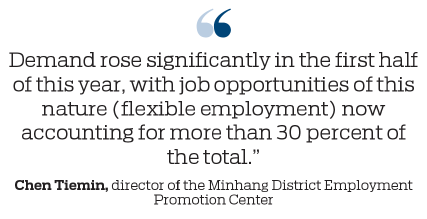YOUNG RECRUITS DRAWN TO THE GIG ECONOMY

Such work offers greater flexibility, time to decide future careers
Zhang Zhinan's parents wanted her to become a civil servant or teacher in her hometown of Ganzhou, Jiangxi province, but the 21-year-old recently found a so-called gig job at a logistics company in Shanghai.
"Gig job" is a popular term for freelance work that has no long-term commitment. Most gig workers are employed on a part-time or hourly basis. They can also decide how often they work.
Zhang's job requires her to work eight hours a day for 30 days. She said she does not yet have a long-term career plan, but hopes to try different occupations and keep her life "free and simple".
She was one of 39 people who found such jobs when a gig employment market opened in Wujing town in Shanghai's Minhang district in late September.
That day, 12 enterprises from the fashion retail, hotel services, express delivery, housekeeping, logistics and mechanical processing industries offered 32 positions.
The gig market in Wujing was the second to be held in the district, following that in Zhuanqiao town, which was launched in August.
Regular recruitment sessions are held at both markets, and the human resources authority in Minhang is considering whether to open two more gig markets in other areas and whether to operate the job markets daily.
Chen Tiemin, director of the Minhang District Employment Promotion Center, said gig markets emerged in China after demand for flexible employment rose by 8 percent to 10 percent annually in recent years.
"Demand rose significantly in the first half of this year, with job opportunities of this nature now accounting for more than 30 percent of the total," Chen said.
National Bureau of Statistics data show that 200 million people were involved in flexible employment in China by the end of 2021, including 100 million born after 1990. Industry insiders predict the former figure will double by 2036.
Last year, five ministries issued a document aimed at strengthening the gig market to better support multichannel flexible employment and help those looking for gig jobs find work.
In Shanghai, the authorities released a document in July, requiring stronger support for the gig market, and improved gig job search and recruitment services.
In Minhang, five offline recruitment activities have been held at gig job markets, and 224 enterprises have recruited more than 3,600 individuals for gig jobs.
Zhang, who has had gig jobs in the logistics and catering industries in Jiangxi since graduating from college in the spring, said the idea of doing such work is commonplace among her peers.
"We joke that we live like USB flash drives. We increasingly prefer to determine our own schedules and stimulate our creativity by working more independently," said Zhang, who studied finance at college.
She said she did not move to Shanghai for money, but for a more diversified choice of jobs.
"For my work, I don't want to lose freedom in terms of time and effort. I won't choose a high-pressure job that requires a high degree of commitment at this stage of my career," she said.
Zhang said she and her peers consider a job that is all-consuming and involves a lot of overtime work is not ideal for them.
"Unlike past generations, we're more likely to regard work as just a part of life, and we're keen to taste different lifestyles," she said.
"Also, to avoid putting pressure on myself to save money for the future, I've never thought deeply about marriage or having children. I will be happy if I can strike a balance between spending and earning."
More spare time
Data from life services platform 58.com show that about two in three of those using its module to find gig jobs are born after 1995, and more than half of these users hold bachelor's degrees.
"Income is no longer the sole factor to gauge a gig job or part-time work. Fun and personal growth have become equally important," Zhang said.
Liu Zixi, 31, an environmental assessment engineer in Shanghai, ended her contract with her previous employer a year ago, before joining the gig economy.
She now operates from home for several companies, and her work includes writing environmental assessment reports. Liu said this new form of work pays just as much as her previous job, but she now has more spare time, as she no longer commutes to work.
"I can now arrange my time much more flexibly, as I can write my work reports anywhere, anytime. I also no longer have to line up at popular restaurants after work, because I can get to them before other customers start arriving," Liu said.
Wu Bo, general manager of Shanghai Minpu Human Resources Group, said young people are generally free-spirited and have few worries about the future.
He said that in May, Shanghai introduced a policy to provide social insurance to residents from other areas of the country who are engaged in flexible employment in the city, adding that the policy gives people a better sense of security in choosing a gig job.
Development of the new economy and fresh business formats has also created a variety of job openings in the gig market for applicants to choose from, Wu said.
A decade ago, many young people typically worked in digital products factories, but now they prefer food delivery jobs or driving ride-hailing vehicles, he added.
"Such new forms of work are more rewarding, and workers enjoy a high degree of flexibility. If they run short of money these days, they can work for longer hours. If they want to spend more time on themselves, they just call it a day," Wu said.
Greater mobility nationwide and increasingly advanced information technology also allow many people to work in the gig economy in a city for just a short period, before they move on to other locations, Wu said.
He added that his company's accounts on short-video platforms such as Douyin and Kuaishou have more than 2 million followers, and such outlets make it easy for gig job recruitment information to reach people from different areas of the country.
"Some people attracted to a particular type of work travel to Shanghai from their hometowns. They make a certain amount of money from the job before moving on to their next destination," Wu said.
Parents of young people today are also different from their predecessors, who had high hopes of their children finding stable, high-paid jobs.
Shen Weiwei, 53, whose son graduated from university in Shanghai this year, said: "Millennials such as my son are now joining the workforce. They are mostly the only child in their family, and they grew up in a time of much better material conditions than previous generations. Instead of making big money, I hope my son will live a healthy and meaningful life that he enjoys."
Shen's son, who works as an intern at an advertising company, has yet to feel the desire to find a better-paid job.
Industry insiders said the effects of the COVID-19 pandemic were also an important factor in the gig economy's rise. In recent years, part-time online work and sharing employees have become popular.
Lower costs
Gig employment's continued momentum is not solely the result of changing philosophies among job seekers, but also employers, who feel that such jobs make the employment process easier and reduce costs, especially in industries with seasonal demands, such as travel and logistics.
A human resources manager at luxury brand Louis Vuitton, who only wanted to be identified as Cao, said nearly 80 percent of the workers at the company's cosmetics and clothing warehouses in China are part-time employees.
During the annual June 18 and Nov 11 shopping festivals, the company needs some 2,000 part-time workers for several weeks to handle surging orders, Cao said.
At some food factories, gig workers now comprise a rising proportion of the workforce as employers seek to better control costs.
Feng Xiaoxia, a human resources manager at Shanghai Shaowansheng Food Plant in the city's Pudong district, which mainly produces handmade steamed bread, said 40 percent of the employees at the plant are gig workers who are mainly used in noncore positions, such as packaging.
Compared with traditional part-time jobs, which usually last three or four months, a gig job may only require a worker for one or two days, she said.
"The company now sells online and offline, so if a large order is received online, workers may be needed temporarily. But as our orders are not stable, we cannot afford to employ a large team of full-time workers," Feng said, adding that the preference for gig workers began last year due to the lasting effects of the pandemic.
The authorities in Shanghai's Huangpu district have launched an online gig market platform, providing opportunities in the internet, new energy, and artificial intelligence industries, among other new economies.
Since the platform launched in June, it has handled more than 2.45 million chats between job seekers and enterprises.
Zhou Lei, director of Huangpu District Human Resources and Social Security Bureau, said gig jobs are aimed more toward younger people, especially college graduates.
Xuan Chen, deputy director of Huangpu District Employment Promotion Center, said, "Some new economies and formats, such as livestream marketing, online design and development, and cloud customer services, do not require employees to stay in a fixed office space, as flexible working systems can be a better fit."
For some young people, especially college graduates, gig employment offers them a "buffer" in the job market.
Jing Xiaofeng, director of Shanghai Polytechnic University's admissions and employment office, said one difficulty for some college students in recent years is that they lack corporate internship experience due to the pandemic, and feel confused about their career development.
Gig jobs, to some extent, give them the opportunity to initially enter the workplace, experience a corporate atmosphere, and find a direction for their future careers, he said.
zhouwenting@chinadaily.com.cn
























